Chimney Oxford FAQs
Chimney Oxford FAQs
The world of chimneys can be difficult and confusing, what with so many different parts and additional required parts to maintain and keep in usable condition. Here at Turner baker, we are the experts in all things chimney. From constructing chimneys to installing new chimney liners. We have many years experience and can advise you on any chimney Oxford work that is required on it. The article below answered our frequently asked questions. However, if you have a question that isn’t listed here, please call us on 01173 360470.
- Do I need to line my chimney?
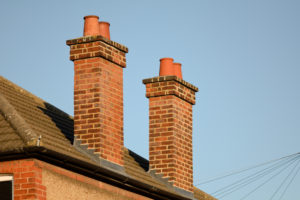 If you are installing a chimney in a new build property and you intend to use it for an open fire, wood burning stove or gas fire, then the chimney does need to be lined to comply with document J of current building regulations. In an older property, your chimney doesn’t have to be lined to meet building regulations. An inspection by a chimney professional will tell you if you need to have it lined for safety purposes.
If you are installing a chimney in a new build property and you intend to use it for an open fire, wood burning stove or gas fire, then the chimney does need to be lined to comply with document J of current building regulations. In an older property, your chimney doesn’t have to be lined to meet building regulations. An inspection by a chimney professional will tell you if you need to have it lined for safety purposes.
- Are chimney liners safe?
- Chimney liners are safe if they are installed and used correctly. If you are intending to use an open fire, wood burning stove or gas fire in your home it is important to follow the safety instructions provided by the manufacturer. For example, chimney liners still need to be swept regularly. Also, if you are burning wood it should be well seasoned and contain no minimal amounts of moisture. Never burn any kind of pre-treated timber that may leave a chemical residue on the inside of your liner. Additionally, to ensure the best results for your chimney always engage the services of a qualified chimney professional for advice on the right type of liner and correct installation.
- How long will a chimney liner last?

- Different liners have a different life expectancy. An entry point stainless steel flue liner will have a 10-year guarantee. A more expensive stainless steel liner will have a 20-year guarantee. Isokern pumice liners have a 10-year guarantee. Furanflex flue liners have a 20-year insurance backed guarantee. A regular maintenance programme and following the instructions provided by the manufacturer for the appliance that you are using will help to prolong the life of your chimney liner.
- Is a chimney liner necessary?
- A chimney liner is obligatory if you are installing a wood burning stove, gas fire or open fire in a new build property to comply with Document J of current Building Regulations. A chimney liner may be necessary for an older property if the flue inside your chimney is no longer safe to use. A CCTV inspection carried out by a chimney professional will clearly show the condition of your flue.
- Should a chimney breast get hot?
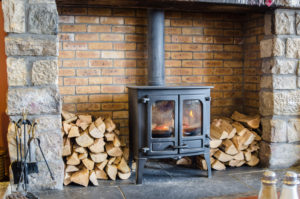
- No, it shouldn’t. If it is getting very hot then it could be that there is a chimney fire in your flue. If you suspect that you may have a chimney fire in your flue you must telephone the fire brigade. A well-lined chimney should be insulated to ensure that the heat from the smoke does not escape to other parts of the property. A flue works in a similar way to a distillation column – volatile hydrocarbons enter the flue at the bottom in a gaseous form e.g. tar, creosote and paraffin. As heat is lost through the chimney the gases will cool and these hydrocarbons will condense and coat the surface of the flue increasing the risk of a chimney fire. Heat loss will also equate to a loss of draw within the flue.
- Why does my chimney not draw correctly?
- The successful draw of a chimney can be influenced by many factors. The first step is to make sure that your chimney flue has been swept by a professional chimney sweep who will clear any blockages. Blockages may be caused by birds dropping debris, cobwebs, falling masonry etc. If your chimney is in a poor condition, this may also affect the draw. If the dimensions of a fireplace are altered this can have a detrimental effect on the draw. The dimensions of a fireplace should always be calculated to be efficient with the dimensions of the associated chimney flue. External factors, for example, other buildings and trees may also affect the draw of your chimney.
- Should I have my chimney inspected?
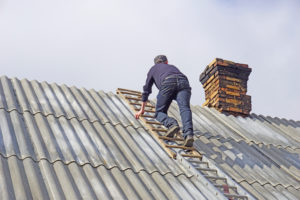
- If your chimney hasn’t been used for a long time and you decide that you would like to start using it again you should have it inspected by a chimney professional before lighting a fire. If you have had a chimney fire, you should also have your chimney inspected by a chimney professional before using it again. If you have any concerns about the performance of your chimney e.g. poor draw, smoke escaping into other parts of the property etc, this also necessitates a chimney inspection.
- Does a chimney with a liner need sweeping?
- Yes, a chimney with a liner does need sweeping debris from birds, cobwebs and deposits can collect in a liner. It is recommended that you have your chimney swept at the following intervals for the different fuel types shown:
- Smokeless fuel: At least once a year
- Wood – Quarterly when in use
- Bituminous coal – Quarterly when in use
- Oil – Once a year
- Gas – Once a year
- Why is my chimney leaking?
- Your chimney is leaking because the internal surface of the flue or a joint in the flue may have failed. Where a chimney is constructed from brick, the bricks may degrade and crumble over time and it is likely that the mortar in between the bricks will degrade as well. If your chimney has been lined with clay liners, these are dropped down inside the chimney in several pieces. If a joint fails in-between the pieces of the liner, smoke will escape.
- Can a chimney catch fire?
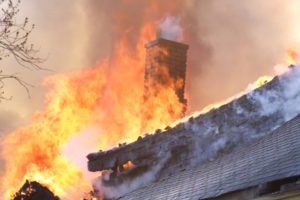
- Yes, a chimney can catch fire. A poorly maintained chimney flue that has not been regularly swept will inevitably suffer from a build-up of deposits, such as tar that can be left stuck to the sides of the flue as the smoke travels up through it. A spark from the fire can be carried through the flue which may ignite these deposits causing a chimney to catch fire.
- Why should chimneys be cleaned?
- Chimneys should be regularly cleaned or swept, to avoid a chimney fire. A fire in a chimney can spread frighteningly quickly, igniting any timbers that are close to the chimney and from there to the rest of the property. A regular clean or sweeping will ensure that any deposits, debris from birds, cobwebs or falling masonry are cleared from the chimney flue. A chimney should also be cleaned or swept to ensure optimum performance from the appliance that you are using. Always ensure that you engage the services of a professional chimney sweep.
- Are there different types of chimney liners?
- There are several different types of chimney liners that are suitable for different uses and available at a range of price points. The entry level for chimney liners is stainless steel, which is the most cost-effective, but with a limited lifespan. Pumice chimney liners are an ideal solution for a new build property. Pumice is a high-performing insulator, will withstand high temperatures and is easy to install. The Furanflex thermosetting resin lining system is a relative newcomer to the market but comes with many benefits. It is easy to install and works well in properties that have a chimney that isn’t straight, or where the dimensions of the chimney flue must not be impacted by the fitting of the chimney liner.
- Why do chimneys catch fire?
- Chimneys catch fire for a number of reasons. The most common of which is poor maintenance. Sweeping your chimney flue regularly will remove any cobwebs and anything dropped by birds or other combustible materials that could cause a chimney fire. A spark from the fire can be carried through the flue which may ignite these deposits causing a chimney to catch fire.
- Why do chimneys need to be lined?
- If you are installing a chimney in a new build property and you intend to use it for an open fire, wood burning stove or gas fire, then the chimney does need to be lined to comply with document J of current building regulations. In an older property, your chimney doesn’t have to be lined to meet building regulations. An inspection by a chimney professional will tell you if you need to have it lined for safety purposes.
- Can a chimney liner be replaced?
- Some chimney liners can be replaced. Stainless steel chimney liners can in a lot of cases be removed and replaced with a new liner. With other lining systems such as cast-in situ where the original chimney flue is lined with a cement and pumice liner that is cast-in situ, it is very difficult to break out of the flue. It is possible to put another liner inside a cast-in-situ flue but this will inevitably reduce the size of the flue and may affect the draw of the flue.
- Why do chimneys draw?
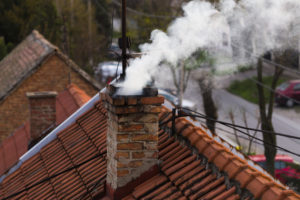
- The purpose of a chimney is to take the products of combustion (smoke and gases) from the appliance to the atmosphere outside the building. At the same time, to draw air for combustion into the appliance. This movement of combustion air and exhaust is called draft. The difference in pressure and temperature between the air/gases inside the chimney flue and the outside air creates movement. (warmer, lighter gases in the flue tend to move upward).To keep the pressure conditions favourable, we need a tall column of warm air inside the chimney and cooler air outside. The warm air will tend to rise, drawing the exhaust from the appliance out. As air exits the chimney, fresh air for combustion is drawn into the appliance.
- Can rain get down my chimney?
- Yes, depending on the cowl or chimney pot that you have fitted. Systems are available that will help to reduce the amount of rain that can get down the chimney. It is not possible to totally prevent rain from coming down a chimney that is in use as if you have an opening to allow the smoke to escape safely, it is possible that rain may get in.
- Can a blocked chimney cause damp?
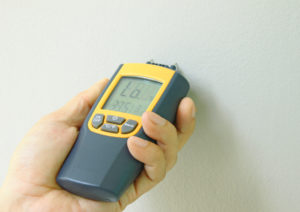
- Yes, it can. Static air within a chimney can cause condensation. Also, any blockage in a chimney can act like a sponge for water that may be getting into the chimney. A survey by a chimney professional may be able to show if a blocked chimney is causing damp.
- Can a chimney be blocked off?
- Yes, a chimney can be blocked off, but you must still maintain some air movement through the flue to prevent condensation. If you are thinking of blocking off a chimney it is always a good idea to ask a chimney professional for advice.
If you’re looking for advice on a chimney on your property, call Turner baker today on 01173 360470. We are a trusted, experienced and knowledgeable chimney Oxford company.
« See all news




 If you are installing a chimney in a new build property and you intend to use it for an open fire, wood burning stove or gas fire, then the chimney does need to be lined to comply with document J of current building regulations. In an older property, your chimney doesn’t have to be lined to meet building regulations. An inspection by a chimney professional will tell you if you need to have it lined for safety purposes.
If you are installing a chimney in a new build property and you intend to use it for an open fire, wood burning stove or gas fire, then the chimney does need to be lined to comply with document J of current building regulations. In an older property, your chimney doesn’t have to be lined to meet building regulations. An inspection by a chimney professional will tell you if you need to have it lined for safety purposes.








